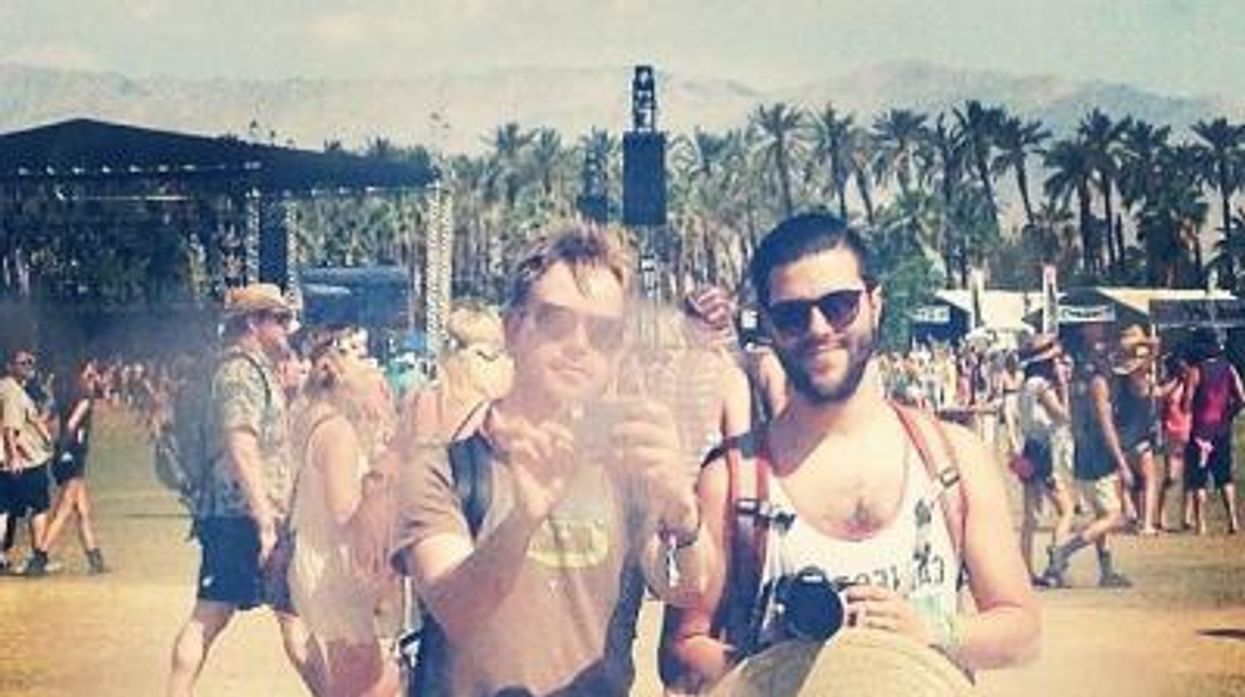
Many gay men have mastered the art of not letting sex kill a friendship. Thanks, smartphones.
April 20 2015 7:00 AM EST
Nbroverman
By continuing to use our site, you agree to our Privacy Policy and Terms of Use.

Many gay men have mastered the art of not letting sex kill a friendship. Thanks, smartphones.
I met this guy on Grindr. He "hosted," I arrived, we awkwardly talked about our jobs, and then, at some point, we rolled around in bed. That was three years ago and we've been inseparable since. Pedro and I share many of the same interests; music, architecture, news, Broad City. We travel together, he watches my dog when I'm out of town, we tell each other "I love you." Did I mention we both have boyfriends now?
We're not part of a Radical Faeries commune. We're just friends. When we're asked how we met, we'll usually smile and say, "Grindr." Most gay folks flash back a knowing, half-teasing smile, while most straights look back in confusion. "It's like Tinder," we'll say. Most hetero faces will register some shock that they'll quickly try to suppress.
That prudish sentiment was registered in a recent Los Angeles Times article focusing on a similar relationship between two gay men. Reporting on a wide-ranging controversy involving West Hollywood City Council member John Duran, the Times picked up one small, juicy nugget of the story and blasted it on its home page with the following headline: "West Hollywood Councilman Admits He Had Sex With Man He Hired as Deputy."
It didn't really seem to me like an "admission" by Duran. With gossip swirling about their relationship, the councilman said he and his deputy Ian Owens met through Grindr, became platonic friends afterward, then Duran later hired Owens because of his degree in finance and background in real estate. Responding to the Times reporter who wrote the incendiary piece, Duran texted, "People are trying to make [Owens] sound like he was unqualified and got the job based on a one-time incident. It's just not true and not fair to him."
The reaction by media and straight commentators to Duran and Owens's past recalls that uncomfortable look Pedro and I sometimes receive. Is it really that shocking that two people met once, hooked up, and then decided they didn't want to disappear from each other's life? Maybe it just seems like the type of gay behavior that straight people are always warned about by homophobes. It plays into the stereotype that gay men have sex like rabbits; that they greet each other not with a handshake but a hand job.
I used to worry that people would register judgment upon hearing how Pedro and I met, but now I own it. I love Pedro, and if it took Grindr to bring us together, so be it. It's an accomplishment that we met under such circumstances and managed to remain friends. After our original assignation, we hung out again and had a few awkward dates where I tried to end the evenings where our first one concluded -- but Pedro didn't want to take it there again. It took me a while to take the hint, but after nursing my bruised ego, I eventually moved past it and appreciated having Pedro in my life, no matter what form the relationship took. It takes some growing up to come to that realization, at least for me.
In my 20s, I wouldn't have been able to keep Pedro in my life; I couldn't accept that someone who had sex with me once wouldn't want to again. Am I fat? Am I annoying? I would pile the blame on myself instead of just accepting that some people are just better meant to be friends. The truth is, short blond white guys are just not Pedro's type. It took a long time for me to accept that not everyone had to love me or want me or even like me. Knowing this means I don't have to hate everyone I break up with or who I don't necessarily vibe with. There are a lot of people in the world, and if we fell in love with everyone we met, no one would get anything done.
The immaturity I carried in my 20s affected how I viewed not only myself but other gay men. I once had a boss who I discovered had a one-night, app-enabled liaison with a coworker -- years before they worked together. Upon hearing that, I clutched my pearls and wondered how it didn't affect everything in the office. Then I experienced their rapport firsthand and saw whatever conflicts or camaraderie they shared had nothing to do with that long-ago night. They had moved past it and worked together as peers. It was a great lesson to learn and one that helped enable my friendship with Pedro.
Maybe the shocked reaction by some heterosexuals to Grindr is justified -- gay male sexual culture is indeed different that straight. Women have to be more careful meeting up with a male stranger who, in many cases, can physically overpower them. Two men are usually on a more even physical playing field and have similar desires (not to say women don't like sex, but most ladies I know, including lesbians and bi women, aren't about anonymous trysts). A decade ago I would have thought the straights have it better because hook-up culture is not as pervasive and society strongly encourages them to pursue long-term relationships and monogamy. Now, I'm no longer so sure; Pedro and I are both in meaningful LTRs, yet we survived our Grindr phase and both managed to grow from the experience. Being gay makes life more challenging -- sometimes, that's a beautiful thing.
NEAL BROVERMAN is executive editor for The Advocate. Follow him on Twitter @nbroverman
Charlie Kirk DID say stoning gay people was the 'perfect law' — and these other heinous quotes